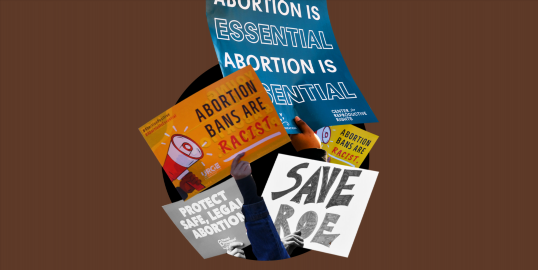Reality Check: The Anti-Choice Agenda Has Always Been Fueled by White Supremacy

Today, the Supreme Court will hear arguments in Dobbs v. Jackson Women’s Health Organization, the case concerning Mississippi’s 15-week abortion ban that was passed by the state’s anti-choice legislature in 2018 and later struck down in federal court. It represents a direct challenge to Roe v. Wade and edges us all closer to the possibility of living in a post-Roe nation.
But in a certain sense, we’re already there. After three months, the Supreme Court has failed to strike down Texas’s SB 8, a blatantly unconstitutional, vigilante-enforced ban on abortion before most people even know they are pregnant. This draconian law is still in effect, rendering Roe all but meaningless in the second largest state in the country.
The fact that both of these cases have reached our nation’s highest court in 2021 is the culmination of a half-century crusade by an anti-choice movement bent on maintaining power.
Yet too few are talking about what I see as one of the most insidious parts of the story: how attempts to restrict reproductive freedom are rooted in a racist agenda that has long relied on preserving a culture of white supremacy, while also weaponizing and capitalizing on white fear.
It is a feature, not a bug, that attacks on abortion access harm folks who are already marginalized most of all. Laws dismantling abortion access—including the more than 100 restrictions enacted in states across the country just this year—compound on each other, increasing the costs of care, closing down clinics that may never again open, and stigmatizing both those who need care and the doctors who provide it.
Opposition to abortion has become a litmus test in conservative circles: a reliable indicator of a willingness to adhere to right-wing philosophy.
Our colleagues in the reproductive justice movement have been connecting the dots between racism and attacks on reproductive freedom for decades. These attacks are motivated by an agenda to control people—especially women of color. In fact, while the modern conservative movement pretends their opposition to abortion is rooted in “morality,” the fact is that the far right only began strategically targeting abortion after losing mainstream support for their school segregation platform in the late 1960s.
Since then, opposition to abortion has become a litmus test in conservative circles: a reliable indicator of a willingness to adhere to right-wing philosophy. And so conservative politicians worked to solidify a supermajority on the Supreme Court likely to undermine reproductive freedom and push through the right’s other unpopular, regressive policies.
It’s an evolution I’ve witnessed up close, fueled by a bigotry that has touched my own life. My family immigrated to the United States from India in 1973—the same year that Roe v. Wade was decided. Some of my earliest childhood memories are of a hate group called the Dotbusters that terrorized Indian American communities in New Jersey and New York by threatening and harassing women with bindis on their foreheads.
Growing up, first in New Jersey and later in Texas, I often felt like an outsider because I was a brown girl, an immigrant with different cultural practices, and not a Christian. And when I spoke up about things that mattered to me, in this case my concerns about the first Gulf War, a teacher in high school who wanted to shut me down said, “If you don’t like it here, go back to where you came from.”
Even now, as I step into a new role leading the nation’s oldest membership organization fighting for abortion access—the first immigrant and person of color to ever do so—I’m acutely aware of how people in our country stoke difference and division to achieve electoral and political gains. It is this very strategy that has brought us to this moment of crisis.
As oral arguments begin today, everything we’ve fought for is on the line, and we must see how protecting our reproductive rights intersects with the need to eradicate white supremacy. The Jackson Women’s Health case is undoubtedly a pivotal moment in our fight for abortion rights and access. But no matter what happens, racism stands in the way of achieving the freedom and equity we strive for. If we are to achieve true reproductive freedom, it is on all of us to dismantle it.
Source: Read Full Article
